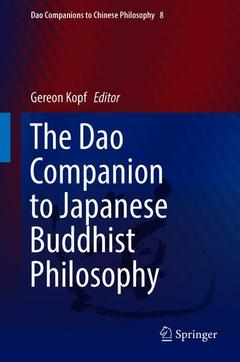The Dao Companion to Japanese Buddhist Philosophy, 1st ed. 2019 Dao Companions to Chinese Philosophy Series, Vol. 8
Coordonnateur : Kopf Gereon

The volume introduces the central themes in and the main figures of Japanese Buddhist philosophy. It will have two sections, one that discusses general topics relevant to Japanese Buddhist philosophy and one that reads the work of the main Japanese Buddhist philosophers in the context of comparative philosophy. It combines basic information with cutting edge scholarship considering recent publications in Japanese, Chinese, English, and other European languages. As such, it will be an invaluable tool for professors teaching courses in Asian and global philosophy, undergraduate and graduate students, as well as the people generally interested in philosophy and/or Buddhism.
Content Table and Authors.- Introduction.- A: Basic Issues in Japanese Buddhist Philosophy.- Chapter 1: “Japanese Buddhism” or “Buddhism in Japan.- The Category “Japanese Buddhism”; Richard Payne.- Is There Such a Thing as Buddhist Philosophy in Japan? John Maraldo.- Buddhist Philosophy; Makio Takemura, translator: Eiji Suhara.- The Role of Women in Japanese Buddhist Philosophy; Michiko Yusa.- Buddhist Theory and Culture in Japan; Rein Raud.- Chapter 2: Current Issues in Japanese Buddhist Philosophy.- The Reception of Buddhist Thought by Contemporary Philosophers in Japan; Ralf Mueller.- Interaction Between Japanese Buddhist Philosophy and Confucianism; Tomomi Asakura.- The Philosophy Underlying Buddhist Art; Pamela Winfield.- Violence and Salvation in Buddhism; Manabu Watanabe.- Buddhist Socialist Thought in Modern Japan; James Shields.- B: Individual Thinkers.- Chapter 3: Japanese Buddhist Philosophy Before the Meiji Period.- Saichō; Victor Forte.- Kūkai; David Gardiner.- Jōkei; Jay Ford.- Hōnen; Mark Blum.- Dōgen; Steven Heine.- Keizan; Shudō Ishii, translator: Ching-yuen Cheung.- Shinran; Dennis Hirota.- Nichiren; Ruben Habito.- Chūgan Engetsu; Steffen Doell.- Takuan Sōhō; Dennis Lishka.- Hakuin Ekaku; Juhn Ahn.- Bankei Yōtaku; Enshō Kobayashi, translator: Thomas Kirchner.- Chapter 4: Japanese Buddhist Philosophy After the Meiji Period.- Nakamura Hajime; Toshi’ichi Endō.- Inoue Enryō; Rainer Schulzer.- Nishida Kitarō; Mayuko Uehara, translator: John Krummel.- Nishitani Keiji; John Krummel.- D. T. Suzuki; Michiko Yusa.- Kiyozawa Manshi; Robert Rhodes.- Tamaki Koshirō; Makio Takemura, translator: John Krummel.- Hisamatsu; Andre van Braakt.- Ueda Shizuteru; Brett Davis.- Hiratsuka Raichō; Saeko Kimura.
Date de parution : 07-2019
Ouvrage de 749 p.
15.5x23.5 cm



